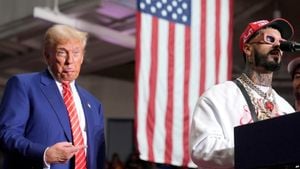With the cold winds of tension swirling between the U.S. and Russia, the specter of nuclear confrontation looms larger than ever. Since the conclusion of the U.S. presidential elections, Russian President Vladimir Putin has escalated his rhetoric, turning the threat of nuclear war from mere talk to strategic maneuvering. His moves have not gone unnoticed, with the West responding with its own adjustments as fears resurface reminiscent of the Cold War.
Experts are observing closely, noting how the Kremlin’s tactics mimic cold war strategies, harking back to significant events like the Cuban Missile Crisis. Moscow appears to have decoded certain elements of the Cold War dynamic, attempting to leverage nuclear posturing against perceived threats with increasing audacity. The recent testing of the intercontinental missile "Oreshnik" by Russia has sent strong signals about its commitment to nuclear capabilities, with military officials claiming readiness to deploy if substantial security threats arise.
According to analysts, the Kremlin’s timeline seems guided by its estimations of how the U.S. administration, led by President Biden, would react under pressure. By conjuring memories of the Cold War, the calculations are likely centered on projecting power both internally and externally. Russian officials believe this nuclear brinkmanship can serve as a potent tool to compel the West to reconsider its policies, particularly relating to Ukraine, where escalations continue to ignite bilateral tensions.
The backdrop of this geopolitical chess match finds the U.S. reassessing its own military strategy. U.S. intelligence reports indicate no immediate threat stemming from Russian nuclear actions, instead pointing to the U.S. decision to allow Ukraine to utilize American weapons against Russian targets. Intelligence emphasizes the concern lies not within nuclear fears, but rather with potential sabotage operations gaining traction within Europe as retribution for Western support for Ukraine.
"We must analyze the scope of alternatives at this juncture," asserted one intelligence source, highlighting the shifting tensions and the dynamic response measures at play. With Russia appearing to pivot its military doctrine, U.S. experts remain vigilant, prepared for possible counteractions from the Kremlin as the stakes rise. There's apprehension, naturally, about Moscow’s psychological operations targeted at manipulating perceptions within the West, exacerbated by Kremlin propaganda circulating alarming narratives about nuclear strikes on Europe.
The U.S. stands firm against these impressions. Rear Admiral Thomas Buchanan, representing U.S. Strategic Command (STRATCOM), recently remarked on the country's fortitude, conveying readiness for any nuclear confrontations with Russia under favorable conditions for the U.S. The assertion of dominance resonates through military circles as Washington emphasizes its capacity for rapid response should diplomatic engagements fail.
Meanwhile, the narrative surrounding nuclear capabilities extends beyond direct confrontation, as Russia’s activities continue to raise eyebrows internationally. The Power of Vigilance (IAEA) has reportedly seen diminishing oversight on Moscow’s nuclear operations, particularly concerning their effects on nuclear power plants near the conflict's epicenter—here focusing on Ukraine. Attacks on facilities such as Rivne, Khmelnytskyi, and South Ukraine are believed to be intended to cripple infrastructure rather than cause total destruction, aiming to incite nuclear panic without direct engagement of nuclear arms.
While this appears to be the Kremlin's strategy, it undeniably poses grave risks, particularly with international scrutiny sharpening. A significant concern, particularly among Western agencies, revolves around access to spent nuclear fuel at these plants—material Russia could leverage for sinister purposes. Chucking this onto the geopolitical heap raises alarms, feeding fears of potential partnerships with nations like Iran and North Korea.
On the flip side, some analysts argue the narrative promulgated by Russia may be imbued with exaggerations concerning its nuclear arsenal. Various assessments suggest Moscow's threats of nuclear reprisals are often more bluster than actuality, with U.S. intelligence indicating insufficient combat preparedness within Moscow’s classified nuclear stockpile. Instead of the catastrophic scenarios often suggested, analysts believe the Kremlin operates within psychological thresholds often riddled by vehement press statements.
Further compounding these anxieties are recent developments from Washington, where the Biden administration has unveiled broader arms support for Ukraine. This signifies not only military strength but also sends messages beyond the battlefield, stirring apprehension deep within the Kremlin. Washington's actions exude confidence—implying strategic capacity to maintain significant influence amid Russia’s nuclear rhetoric.
Such strategically calculated behaviors seem to encompass both sides. The battlefield narrative has begun to acknowledge the rising significance of covert operations and intelligence gathering, with both nations attempting to preserve their fleets of stealthy maneuvering against the backdrop of public posturing.
Meanwhile, as talk of nuclear conflict grows ever more prevalent, analysts caution against complacency. Major cities on different continents may face unprecedented impacts should any nuclear confrontation arise. Research assessing potential attacks with powerful missiles—specifically the R-36M2 or SS-18 Satan—offers terrifying insights, projecting massive potential fatalities and catastrophic infrastructural destruction across U.S. cities like New York, Los Angeles, and Washington, D.C.
The thought of millions of lives squashed under the detonation pressure is overwhelming; estimates find up to 5 million could perish from a single assault—underscoring the devastation associated with even low-yield nuclear engagements.
But back to the present: the U.S. remains focused on deescalation and clearer lines of communication. Moscow has signaled it intends to keep open channels to prevent misunderstandings over missile tests. Despite the talk of spiraling tensions, both sides appear to seek stability—each wary of the costs associated with hostile escalation and deadly miscalculation.
It remains to be seen whether both nations will balance their ambitious political games with the pressing need for diplomatic resolution. The volatility of nuclear politics may strike even the most seasoned negotiators with fear as the legacy of the Cold War remains looming—a reminder of the undeniable gravity of maintaining peace amid military posturing. History has shown us the consequences of missteps; let’s hope this time, diplomacy prevails amid the haze of combat rhetoric.



